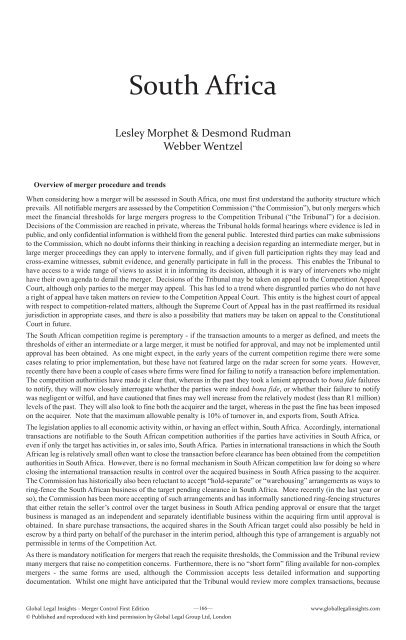Merger Controls First Edition - J Sagar Associates
Merger Controls First Edition - J Sagar Associates
Merger Controls First Edition - J Sagar Associates
Create successful ePaper yourself
Turn your PDF publications into a flip-book with our unique Google optimized e-Paper software.
South Africa<br />
Lesley Morphet & Desmond Rudman<br />
Webber Wentzel<br />
Overview of merger procedure and trends<br />
When considering how a merger will be assessed in South Africa, one must first understand the authority structure which<br />
prevails. All notifiable mergers are assessed by the Competition Commission (“the Commission”), but only mergers which<br />
meet the financial thresholds for large mergers progress to the Competition Tribunal (“the Tribunal”) for a decision.<br />
Decisions of the Commission are reached in private, whereas the Tribunal holds formal hearings where evidence is led in<br />
public, and only confidential information is withheld from the general public. Interested third parties can make submissions<br />
to the Commission, which no doubt informs their thinking in reaching a decision regarding an intermediate merger, but in<br />
large merger proceedings they can apply to intervene formally, and if given full participation rights they may lead and<br />
cross-examine witnesses, submit evidence, and generally participate in full in the process. This enables the Tribunal to<br />
have access to a wide range of views to assist it in informing its decision, although it is wary of interveners who might<br />
have their own agenda to derail the merger. Decisions of the Tribunal may be taken on appeal to the Competition Appeal<br />
Court, although only parties to the merger may appeal. This has led to a trend where disgruntled parties who do not have<br />
a right of appeal have taken matters on review to the Competition Appeal Court. This entity is the highest court of appeal<br />
with respect to competition-related matters, although the Supreme Court of Appeal has in the past reaffirmed its residual<br />
jurisdiction in appropriate cases, and there is also a possibility that matters may be taken on appeal to the Constitutional<br />
Court in future.<br />
The South African competition regime is peremptory - if the transaction amounts to a merger as defined, and meets the<br />
thresholds of either an intermediate or a large merger, it must be notified for approval, and may not be implemented until<br />
approval has been obtained. As one might expect, in the early years of the current competition regime there were some<br />
cases relating to prior implementation, but these have not featured large on the radar screen for some years. However,<br />
recently there have been a couple of cases where firms were fined for failing to notify a transaction before implementation.<br />
The competition authorities have made it clear that, whereas in the past they took a lenient approach to bona fide failures<br />
to notify, they will now closely interrogate whether the parties were indeed bona fide, or whether their failure to notify<br />
was negligent or wilful, and have cautioned that fines may well increase from the relatively modest (less than R1 million)<br />
levels of the past. They will also look to fine both the acquirer and the target, whereas in the past the fine has been imposed<br />
on the acquirer. Note that the maximum allowable penalty is 10% of turnover in, and exports from, South Africa.<br />
The legislation applies to all economic activity within, or having an effect within, South Africa. Accordingly, international<br />
transactions are notifiable to the South African competition authorities if the parties have activities in South Africa, or<br />
even if only the target has activities in, or sales into, South Africa. Parties in international transactions in which the South<br />
African leg is relatively small often want to close the transaction before clearance has been obtained from the competition<br />
authorities in South Africa. However, there is no formal mechanism in South African competition law for doing so where<br />
closing the international transaction results in control over the acquired business in South Africa passing to the acquirer.<br />
The Commission has historically also been reluctant to accept “hold-separate” or “warehousing” arrangements as ways to<br />
ring-fence the South African business of the target pending clearance in South Africa. More recently (in the last year or<br />
so), the Commission has been more accepting of such arrangements and has informally sanctioned ring-fencing structures<br />
that either retain the seller’s control over the target business in South Africa pending approval or ensure that the target<br />
business is managed as an independent and separately identifiable business within the acquiring firm until approval is<br />
obtained. In share purchase transactions, the acquired shares in the South African target could also possibly be held in<br />
escrow by a third party on behalf of the purchaser in the interim period, although this type of arrangement is arguably not<br />
permissible in terms of the Competition Act.<br />
As there is mandatory notification for mergers that reach the requisite thresholds, the Commission and the Tribunal review<br />
many mergers that raise no competition concerns. Furthermore, there is no “short form” filing available for non-complex<br />
mergers - the same forms are used, although the Commission accepts less detailed information and supporting<br />
documentation. Whilst one might have anticipated that the Tribunal would review more complex transactions, because<br />
Global Legal Insights <strong>Merger</strong> Control <strong>First</strong> <strong>Edition</strong><br />
—166—<br />
© Published and reproduced with kind permission by Global Legal Group Ltd, London<br />
www.globallegalinsights.com


